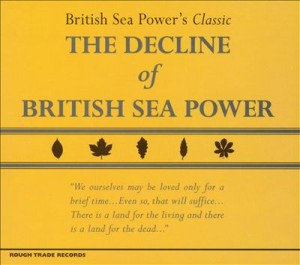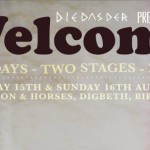 “What the fuck is going on? Am I still dreaming? Am I dying? Am I dead?” Eamon Hamilton, British Sea Power‘s former keyboard anarchist and inexorable marching drummer, is talking about the morning’s breakfast experience.“I walked in, got a table to myself, got a book… And then I hear “The Decline of British Sea Power, album of the day!” And, of course, it’s Radio 6. Like some weird acid trip flashback. Arghhhh…”
“What the fuck is going on? Am I still dreaming? Am I dying? Am I dead?” Eamon Hamilton, British Sea Power‘s former keyboard anarchist and inexorable marching drummer, is talking about the morning’s breakfast experience.“I walked in, got a table to myself, got a book… And then I hear “The Decline of British Sea Power, album of the day!” And, of course, it’s Radio 6. Like some weird acid trip flashback. Arghhhh…”
It is now later in the day and British Sea Power have just played a triumphant gig in Wakefield, opening Long Division festival. Sitting on the stairs alongside Eamon is Martin Noble, guitarist and one of the founding members of the band. Eamon is still buzzing with post-gig energy and euphoria of returning to the fold after a number of years in the wilderness of married life in America. His feelings about the all-important 12-year anniversary of the album and his reunion with the band cannot be more obvious: “Fantastic! Telepathy is still there! It’s a fucking great album! It sounds fucking amazing!” Noble remarks that “back in the day” they never played the album start to finish. “The album is made for listening at home, not playing at gigs. This is a rather different experience for us all.”
Released on Rough Trade in June 2003, The Decline of British Sea Power caused a stir at the time of its birth and has since emerged as a true classic, rising from the indie pileup of the mid-noughties. Everything about it simultaneously resonated mystery and bold confidence: the strange unattributed quote on the sleeve, the bold claim that this debut album was “British Sea Power’s classic”, the songs hiding literary and mythological references and music infused with romantic poeticism and furious energy. In short, it felt like British Sea Power suddenly sprung up as a rock’n’roll Gesamtkunstwerk, a complete work of art bringing the gap between sonic, visual and conceptual elements of a performance.
Yet, when I ask Noble whether there was a big game plan, a serious conceptual effort in the making of The Decline he smiles saying, “We were just trying to do the best thing we could think of. We hated a lot of bands at that time. So were like, “We’ve got Club Sea Power, let’s stick some trees in there.” There were bands like Star Sailor that were really big, but there was nothing in their songs. We felt we could do a Hell of a lot more. Everyone was into art as well, and we felt it WAS an art. Then bands like Star Sailor were like a vacuum-packed cheese sandwich that costs a quid and doesn’t taste of cheese. We were just angry young men listening to this and thinking, “What the fuck is this? This is shit. Fucking idiot!”
Before joining the band as a keyboard player, Eamon was a fan and a regular of Club Sea Power nights. “I thought they were challenging… Challenging you to question who you ARE. There was so much stimulus, so many ideas.” The abundance of ideas and influences could, at least in part, be explained by the fact the album was a summary of many years’ writing imbued with inspiration and experiences of different BSP characters. Noble thinks for a minute and then says that ‘Lately’ was written back at university. “Scott (BSP’s founding brother, vocalist and guitarist) and I wrote that in 1996. Then some songs arrived right at the very end. That’s how long the album took.”
According to Noble ‘A Wooden Horse’, the closing track of the album, was one of the songs that always had “a self-contained theme.” It didn’t have anything to do with a full concept of the album: “It just happened to have really good imagery about a relationship. And then the whole Trojan horse… It was really lovely. Then we had Hamilton (Scott’s brother, another vocalist, bassist and guitarist) with ‘Blackout’, which was a story from the Lake District.” He smiles and starts laughing at the curious oddity of what he is about to divulge, “Him and his mates used to pass out, sort of a psychedelic countryside mountain experience.” Eamon seems genuinely curious about the ‘passing out’ element of the story enquiring, “Is that when people push your chest?” Noble obligingly confirms Eamon’s theory adding, “Or just hold your breath, or some other weird thing.” He continues saying Roy (their former manager) was also part of the process, “So it was kind of a collaborative thing, pushing and pulling. But here was a focus, kind of wanting to do something better than the things you were slagging off. If you’re going to slag someone off you need to offer something positive.”
The recent re-issue of The Decline, a treat for the BSP connoisseurs and anyone intrigued by this unique band, includes an extensive collection of videos, photographs and recorded material unearthed and assembled together by the band. Noble points out that one of the most interesting things about these rarities is seeing how the music and lyrics of the now-familiar songs from the album evolved over time. “If you listen to a demo CD in the new box set, there are different lyrics there so you can see how they moved from one idea to another. ‘Blackout’ had this beautiful first line, “Long distance running in the old forest”. And there’s ‘Carrion’ when Neil first wrote it with different lines in it. You can see it all being chipped away at and changed. Looking back on it, we realised really great lines never made it, but it’s all for the same purpose; we were all aiming for the same thing.”
Some of the footage from those early days is a testimony to the exuberant spirit of British Sea Power. A 2003 BSP poster bears a quote from The Flaming Lips‘ frontman Wayne Coyne: “They are just a good band. They have trees on stage and they’re doing something really exciting. I wish they’d take more care on stage, though. If they carry on like that they’ll injure themselves.” Noble is quick to admit that he can’t remember what they were doing at the time of recording Julian Cope‘s ‘(Out of my mind on) Dope and Speed’, or why they did it in the first place. Looking at Eamon he says, “He used to be ridiculous in those days. I’ve seen some photographs and it’s like, “WHAT? What ARE you doing?” Brimming with pride, Eamon answers, “There’s a big part of ourselves that’s like a little ram, or a jumping sheep that wants to come out. And then Sea Power open the gate, “HERE YOU GO!” And you’re running around, kicking about…” And then he burst out laughing again.
Later, Eamon proceeds to tell the story of Jeff, a Brighton legend who gave the young British Sea Power a break by offering them a chance to run their own club night, which was duely christened Club Sea Power. “He ran this club called The Lift and been on tour with Stone Temple Pilots. He had those autopsy tattoos all over. You know, the places where you get sliced when you have an autopsy. He had a dark edge to him, but he fucking loved Sea Power!” Noble joins in the story, “It was like a hundred capacity room above a pub, but he put on everything: Sea Power, Eighties B-line Matchbox Disaster, The Strokes played their first UK gig there as well.” As it turns out, Jeff told The Strokes that Sea Power had their own night and didn’t want to support them. “Or he’d just put you on the bill and not even tell you. He’d ring up Roy or Scott and they didn’t know anything about it. We called him Jeff the Liar.” Apart from the now legendary Club Sea Power, Jeff’s lasting legacy was his gift of the now familiar BSP star, the stage bear later named Ursine Ultra. By that time, they already had tree branches and bird effigies on stage, so it was obviously time to get a mammal and all.
Eamon is happy reminiscing about the days of Club Sea Power, “At that time in Brighton there were some designated places to put your bands’ flyers up, but Nobby and Woody (BSP’s drummer) were like, “Fuck that, let’s go and stick it on a tree.”It felt like we were some kind of propagandists. The posters were EVERYWHERE!” He stops laughing for a moment, turning to Noble – “The spirit still remains, doesn’t it?” – who returns with, “It still remains but recovery time is not as quick.”
Recovery time aside, it would seem that over the years British Sea Power have not lost any of their urgency and spirit. Back in 2003 their claim that The Decline was British Sea Power’s ‘classic’ may have seemed simply ridiculous and audacious, a clever joke or an impudent declaration of intent. In 2015, the spirit of British Sea Power is nothing short of an affront to the socio-political agenda of austerity Britain elevating super scrimpers, strivers and hard-working families whilst demonising anything remotely alternative, intellectual and artistic, although it would be wrong to suggest that British Sea Power are overtly political. As Roy Wilkinson, veteran of BSP adventures and brother of Scott and Hamilton, pointed out in his most excellent Sea Power biography ‘Do It For Your Mum’, their objective was always to “have a laugh and have a say.” The perhaps unintended result of their creative vision has become a serious political statement: from the openly pro-immigration stance to the clear disinterest in celebrity culture, frequent historical and literary references, complete disregard of musical trends, unpredictable nature of their live shows and their old school DIY credentials, everything associated with the band suggests subtle subversion and an offence against the prevailing spirit of the age.
And all of this was already there right at the very start of the BSP’s existence when The Decline came into being. By now the album has sold tens of thousands of copies and hopefully its latest reincarnation will bring in new fans. As Eamon enthusiastically declares, “I think it’s brilliant that Sea Power are still making great music. And if people come into it now, they’ve got a whole fuck lots of amazing tunes to discover.”
Before we part I can’t resist asking Noble about their plans for the future. With a sigh, he turns and say, “We’ve done ‘Sea of Brass’ and ‘The Decline’ on Golden Chariot, our own label. We thought we’d actually make money for the first time. With Rough Trade, we never got any. And then you realise you actually have to do the work of a record label… Oh, shit! I think I’ve done two hours of music in the last three months.” Then after a pause he adds, “But after this, we’ve definitely got this eagerness now…”
The Decline of British Sea Power expanded 12th anniversary reissue can be bought HERE.
Photo credit: Graham Coburn




